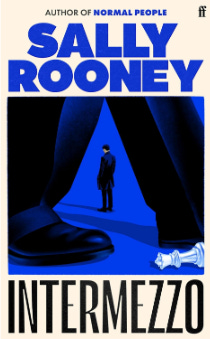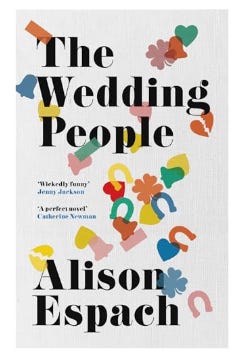Hi everyone,
We have a guest reviewer this week. As AI technologies continue to evolve, some of you may want to become familiar with them. My friend Pablo shares his thoughts on the book “Supremacy: AI, ChatGPT, and the Race that Will Change the World” by Parmy Olson. If you’d to write a review for the newsletter, let me know on the comments.
Enjoy,
mariana
Fiction
Mild Vertigo by Mieko Kanai
My friend Jason and I agreed that we would simultaneously read a book twice per year. This year we started with "Mild Vertigo" by Mieko Kanai.
Mild Vertigo follows middle-class Japanese housewife Natsumi and her seemingly unremarkable existence. Written in 1997 and translated into English for the first time in 2023, it defies conventional categorisation—neither plot-driven nor character-led. Instead, it presents a meticulous monologue chronicling the thoughts and actions of a housewife whose immense knowledge and wisdom society largely disregards.
The narrative unfolds almost like a documentary, with the author delving deep into the protagonist’s mind and heart. The pacing mirrors the rhythm of Natsumi's days—sometimes amusing, mostly tedious. Throughout the reading, I found myself hoping for a significant event, yet days simply roll on without dramatic incident. What struck me most was my inability to determine whether Natsumi felt content or dissatisfied with her life—perhaps both—highlighting the nuanced complexity of her situation.
Those who favour fast-paced novels might find this challenging. The book offers a deliberate, thoughtful examination—essentially dissecting an existence from various perspectives, always from the inside out. With its dense, lengthy paragraphs and experimental techniques, it demands patient engagement. I particularly struggled with two chapters that read more like essays than fiction. Nevertheless, Natsumi's unique perspective on life continuously drew me in, compelling me to seek understanding.
I enjoyed the below two paragraphs from a NYT review : "She is no rebel. She conforms. She is the same at the end of the novel as she was in the beginning. But every now and then, when she is washing dishes, maybe, or watching a lace curtain billow in the breeze, Natsumi comes to a place of quiet revelation so beautiful that it wakes her from this stupor.”
The review further notes: "Kanai leaves it up to the reader to decide whether to judge Natsumi for not trying harder to break free of the thudding dullness of her days, or celebrate her as a quiet success: content to lead the life she's been dealt, however mildly vertiginous it might be."
Stay With Me by Ayobami Adebayo
As soon as we finished reading ‘Mild Vertigo’, Jason recommended ‘Stay With Me’. As a huge fan of Nigerian literature, when he mentioned it was a story about marriage and polygamy in Nigerian culture, I was immediately drawn to the book.
‘Stay With Me’ proved to be a genuine page-turner that completely captivated me. I finished it in three days. The narrative is cleverly crafted with unexpected twists and turns. When Jason first mentioned polygamy, I had mistakenly confused the concept with polyamory—two entirely different practices. I initially anticipated something along the lines of 'All Fours', but what I discovered was thoroughly surprising and complex in different ways.
Set in Nigeria, the story centres on Yejide, who faces social ostracism because she cannot conceive. In her community, this failure to fulfil her perceived duty leads her in-laws to pressure her husband into taking a second wife. This decision places immense strain on their marriage, creating a poignant exploration of love under pressure. The narrative takes another dramatic turn when Yejide finally becomes pregnant.
This book led me to reflect on how gender-based cultural expectations can destroy not only an individual’s self-worth, but entire family structures. It’s no wonder this novel was shortlisted for the prestigious Women's Prize for Fiction.
🎧 Audiobook: ✅ The narration isn’t particularly impressive, but the plot is so compelling that it’s easy to keep going.
Intermezzo by Sally Rooney
When this book first came out, I wasn’t planning on reading it, but my perspective changed after my friend Alejandra shared a podcast episode featuring the author talking about ‘Intermezzo’. I was genuinely impressed by Rooney’s assertiveness—the interviewer repeatedly attempted to sway her opinions, yet she firmly held her ground. Hearing her discuss her work with such clarity and conviction was refreshing. Coincidentally, my sister gave me a copy of the book before Christmas, so I dug in.
Intermezzo follows two brothers in the aftermath of their father's death. The narrative explores how they attempt to navigate their grief, ultimately failing to process it in healthy ways. At its core, the novel examines their emotional illiteracy and its impact on their lives and relationships. However, I think what underpins the narrative is the emotional labour performed by the women in their lives—the invisible work that ultimately enables Ivan and Peter to process life's difficulties.
Rooney’s writing is clever, poignant, and emotionally intense. She crafts her narrative with precision, creating characters whose flaws feel painfully familiar. Through her careful and experimental prose, she illuminates the complexities of grief, connection, and the uneven distribution of emotional work between genders.
Dead-End Memories by Banana Yoshimoto
What can I say? Anything written by Yoshimoto is simply beautiful. Her storytelling consistently moves me, and I simply adore all of her work. I will always read anything she writes.Her characters feel authentic in their yearnings, and with each book, I gain new insights into Japanese culture.
‘Dead-End Memories’ is a collection of five short stories that I read this past winter. Each narrative stands out as both beautiful and original. Throughout these stories, Yoshimoto explores many different topics: loneliness, love, hope, parental expectations, mystery, crime, food, family relationships, friendship, and recovery—to name just a few. If you’re looking for a warm and cozy read, look no further. This collection provides an excellent starting point with Yoshimoto’s work.
Stone Yard Devotional by Charlotte Wood
This work of literary fiction is nothing like I expected, so I'll start by saying I really enjoyed it. However, it’s slow and unconventional, so if you’re not into literary fiction, this might not be for you.
I first heard about this book at the Booker Prize reading event that my friend Sofia invited me to. I knew I wanted to read it when the author shared her driving question behind the novel: "In this day and age, what would it take for someone to become a nun?"
Set in rural Australia, the story follows the disillusioned life of a woman (whose name we never learn) facing a midlife crisis. As the narrative unfolds, we gradually gain insight into her interior world, her past, and what led her to seek refuge in the most unlikely place for someone without faith in God.
Confronted with memories of her childhood, accumulated losses, her present circumstances, and a profound disillusionment with the state of the world, what begins as a simple search for silence transforms into an unexpected way of life. Deeply contemplative, Stone Yard Devotional is a beautiful reflection on grief.
*(Paraphrased, as I can't remember her exact words.)
🎧 Audiobook: ✅
Non-Fiction
Body Work: The Radical Power of Personal Narrative by Melissa Febos
I don’t know how this book ended up in my personal library, but I’m so happy I decided to open it. Melissa Febos is the author of several acclaimed books, including the award-winning essay collection ‘GIRLHOOD’. She is a Professor at the University of Iowa, where she teaches in the Nonfiction Writing Program.
In ‘Body Work’, Febos explores the transformative power of writing as a tool to process our lived experiences. Part-memoir, part-writing masterclass, the book focuses on how we think and write about personal and intimate experiences. Structured as four distinct essays, each one wonderfully crafted, the collection builds a compelling case for the importance of personal narrative.
The writing is beautiful, clear, concise—deeply personal, yet universally insightful. While I recognise that this title might primarily appeal to writers, I believe it has something to offer everyone. Ultimately, ‘Body Work’ is about finding and expressing our authentic voices, a struggle for most of us.
Febos draws from her diverse life experiences, including her time as a dominatrix, to illustrate her points. She writes: "Transforming my secrets into art has transformed me. I believe that stories like these have the power to transform the world. That is the point of literature, or at least that's what I tell my students. We are writing the history that we could not find in any other book. We are telling the stories that no one else can tell, and we are giving this proof of our survival to each other."
The Let Them Theory by Mel Robbins
I don’t have Instagram, so I’m grateful my friend Scott first introduced me to Mel Robbins. He shared a podcast episode featuring her, and I found some of what she said quite thought provoking. The episode piqued my curiosity but left me with questions about how this theory might apply in real-life situations, so I got the book.
The book is rich and layered. I'll likely need to revisit it to fully absorb everything, but even on first reading, I found it profoundly thought-provoking. At its core, Robbins presents a refreshingly simple yet powerful thesis: you cannot control other people. The wisdom lies in letting others do what they must while focusing your energy on your own choices and responses.
At its heart, the theory challenges our instinct to manage the unmanageable—others' thoughts, feelings, actions, and circumstances. When we try to control these external elements, we create unnecessary stress while diminishing our personal agency. The "let them" mindset (allowing others to be themselves, think their thoughts, and navigate their journeys) frees up remarkable amounts of mental and emotional bandwidth.
My review makes it sound boring, but I found it really entertaining and insightful.
🎧 Audiobook: ✅
Rest: Why You Get More Done When You Work Less by Alex Soojung-Kim Pang
I heard about this book through a podcast episode focusing on helping academics navigate their dissertations. In short, this book challenges the conventional beliefs that work and rest
binary opposites or that rest is merely the absence of work. Instead, Alex Soojung-Kim Pang argues that rest and work are complementary partners, each enhancing the other's effectiveness. How we utilise our non-working hours profoundly influences our productivity during working hours, a concept he terms "deliberate rest." The book confronts the widespread assumption that knowledge is produced rather than discovered, suggesting that mind wandering during periods of unstructured rest boosts creativity and insight.
The author advocates for modest working hours—ideally devoting just 4-5 hours daily to focused work—complemented by restorative activities like walking and adherence to supportive routines. By incorporating rest as a fundamental part of one's professional identity rather than viewing it as an indulgence, we can achieve greater creative and intellectual output. As he memorably puts it, "People waste years because they don't waste hours," highlighting that strategic rest isn't time squandered but rather time invested in enhancing our most valuable work.
🎧 Audiobook: ✅
Guest Review by Pablo Riveroll
Supremacy: AI, ChatGPT, and the Race that Will Change the World by Parmy Olson
Parmy Olson’s Supremacy: AI, ChatGPT, and the Race that Will Change the World provides a gripping account of the rapidly evolving field of artificial intelligence, offering readers a clearer understanding of the key players, motivations of tech giants, and the risks posed by this transformative technology.
The book traces the origins and evolution of major AGI (artificial generative intelligence) companies like DeepMind, OpenAI, and Anthropic, shedding light on their founders’ backgrounds and ambitions. Olson effectively illustrates how the abundance of venture capital in the US has cemented its leadership in AI, despite initial breakthroughs in Europe. With limited regulation in the US compared to Europe, this dominance seems unlikely to wane. That said, the recent excitement around China’s Deepseek highlights how innovation can emerge from other quarters too and how deep pockets by themselves are not a big enough moat.
A central theme in the book is the rivalry between OpenAI and DeepMind, highlighting contrasting leadership styles and strategies. For instance, Demis Hassabis of DeepMind, a chess prodigy at 13, favoured a cautious, research-oriented approach, wary of AGI’s risks. In contrast, OpenAI’s Sam Altman applied his Y Combinator playbook—releasing products early to gather user feedback. Adding intrigue, Elon Musk was an early investor in both companies.
While many AGI ventures began with noble intentions, including ties to the Effective Altruism movement, Olson reveals how the need for funding and scaling often forced them to prioritise powerful models over ethical aspirations. Partnerships with tech giants like Microsoft (OpenAI), Alphabet (DeepMind), and Amazon (Anthropic) became inevitable.
The book delves into significant moments, such as DeepMind’s thwarted efforts to establish an independent ethics board and Hassabis’s intention to focus on AGI on more noble pursuits than making Google more powerful. Shortly after the book was published, Hassabis won Nobel Prize in Chemistry in 2024 for AI model AlphaFold2, which predicts protein structures. These achievements underscore both the promise and perils of AI development.
Olson also addresses AI’s ethical challenges: risks of data privacy breaches, systemic biases, and the concentration of power among a few dominant players. She refers to the social media labels “accels” (advocates for rapid AGI deployment) and “decels” (cautioning against existential threats), showing how most founders are pulled toward the “accel” camp by their corporate backers.
In conclusion, Supremacy offers a compelling narrative of AI’s transformative potential and the ethical, regulatory, and societal dilemmas it presents. Olson’s work is an essential read for anyone seeking to understand this groundbreaking technology.







































